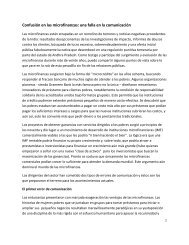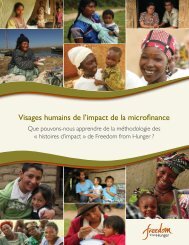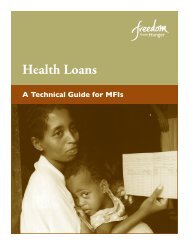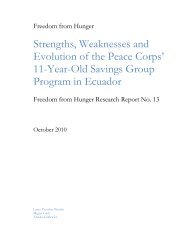Voices from the Frontlines: - Freedom from Hunger
Voices from the Frontlines: - Freedom from Hunger
Voices from the Frontlines: - Freedom from Hunger
Create successful ePaper yourself
Turn your PDF publications into a flip-book with our unique Google optimized e-Paper software.
credit officer shared that, “Here when we have meetings, we always talk with <strong>the</strong> coordinator but <strong>the</strong>re are<br />
very few times when we see <strong>the</strong> results of our suggestions.” Ano<strong>the</strong>r credit officer echoed <strong>the</strong> same<br />
challenge: “We basically don’t do that because all of our suggestions never end up being taken into account.”<br />
However, his colleagues were just as likely to say, “I communicate with [<strong>the</strong> organization] through a<br />
monthly meeting in which we talk and explain needs of our clients. There is also a good environment for sharing<br />
ideas, such as my idea about <strong>the</strong> fair for my clients to sell goods.” So, for some credit officers, <strong>the</strong>y see<br />
<strong>the</strong>ir ideas eventually put into practice, and for o<strong>the</strong>rs, sharing with <strong>the</strong>ir supervisor leads to a<br />
black hole of client information.<br />
When supervisors were asked this same question, <strong>the</strong>ir answers seemed to reflect a reality in<br />
which <strong>the</strong>se data are crucial for product ideas and changes discussed at <strong>the</strong> management level. A<br />
supervisor shared, “Many of our products have been adjusted based on what <strong>the</strong> credit officers have told us.<br />
Our credit officers are our eyes. I’m sure this is not always <strong>the</strong> case, as many credit officers have said, but at least<br />
<strong>the</strong>re is <strong>the</strong> acknowledgement of importance.” Ano<strong>the</strong>r supervisor said, “Everything that we plan comes <strong>from</strong><br />
bottom to top.” O<strong>the</strong>r supervisors shared similarly, “We learn of <strong>the</strong> variety of products and services that<br />
our clients want via our credit officers. For example, we know that our clients are asking for ‘health fairs/clinics’<br />
and have begun to think of how to implement <strong>the</strong>m.” Ano<strong>the</strong>r supervisor shared how information was<br />
passed along to leadership: “Yes, we are listening because each branch has a branch leader who takes care of<br />
<strong>the</strong> credit officers and <strong>the</strong> clients; <strong>the</strong>y listen to <strong>the</strong> needs and feed this information to <strong>the</strong> central leadership.”<br />
How can we better support credit officers?<br />
Credit officers were asked about tools and processes that would make <strong>the</strong>ir jobs easier as well as<br />
changes that would improve <strong>the</strong>ir performance as a credit officer. Supervisors were asked what<br />
processes <strong>the</strong>y have in place to support <strong>the</strong>ir credit officers in balancing client and organizational<br />
needs.<br />
1. In all organizations, credit officers desire efficiency and tools to do <strong>the</strong>ir job better—<br />
technology, motorcycles, marketing materials, tools geared toward reaching rural<br />
clients. Credit officers commonly cited technology as a desired facilitator of <strong>the</strong>ir work. Many<br />
felt <strong>the</strong> forms <strong>the</strong>y had to fill out at <strong>the</strong> end of a long day could be filled out during <strong>the</strong> day if<br />
<strong>the</strong>y were able to input group information into a computer as <strong>the</strong> day progressed. “[My<br />
organization] asks for lots of documents and <strong>the</strong> women want <strong>the</strong> credit quickly—this loses <strong>the</strong> essence of an<br />
opportune credit.” Also, this credit officer shared that <strong>the</strong> process of closing a cycle is done<br />
manually, which she said is sufficient but takes too much time. “Perhaps using a computer to do this<br />
would be easier.” Among <strong>the</strong>se five organizations that primarily focus on rural lending and village<br />
banking, <strong>the</strong> lack of personal transportation, generally motorcycles, was cited as a reason for low<br />
productivity. Many relied on poorly maintained motorcycles or had to use public transportation<br />
to reach <strong>the</strong>ir groups. This often resulted in only attending to one or two groups per day,<br />
depending on how far apart <strong>the</strong>se groups were located. “Transport. We are limited in this aspect. They<br />
ask for results first but without tools for <strong>the</strong> job. For example, we are six credit officers in this branch and we only<br />
have three motorcycles.” Marketing and promotional materials were often cited as tools to improve<br />
<strong>the</strong>ir ability to recruit new clients and to advertise new products to existing clients. Credit<br />
<strong>Voices</strong> <strong>from</strong> <strong>the</strong> <strong>Frontlines</strong> 17















